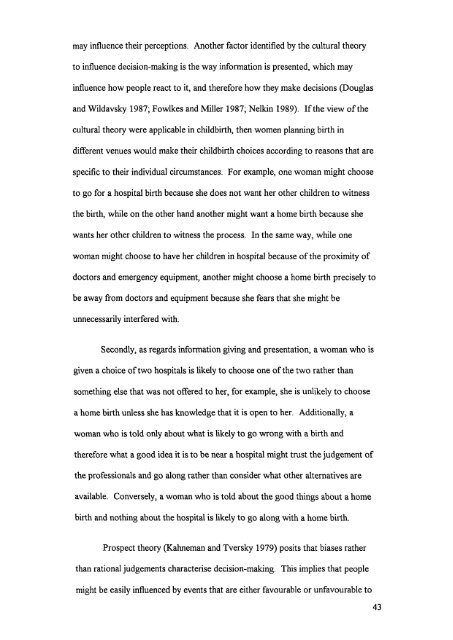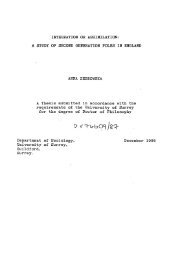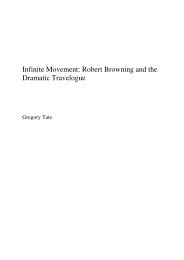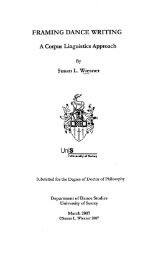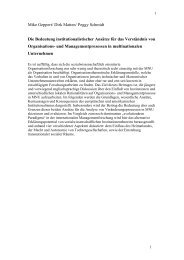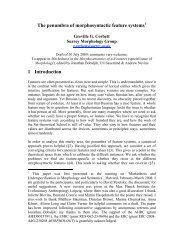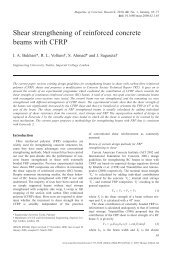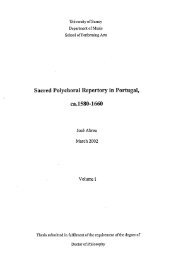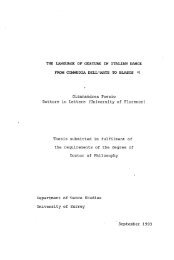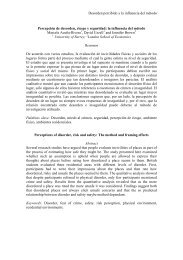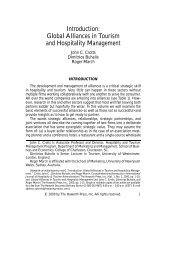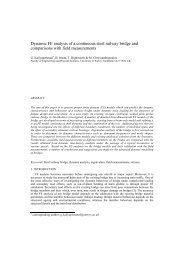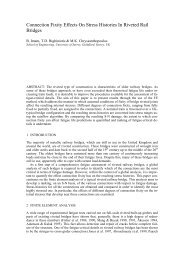- Page 1 and 2: Women's Decision-Making And Factors
- Page 3 and 4: Figure 1: The paper elimination pro
- Page 5 and 6: Home themes with supporting quotati
- Page 7 and 8: Acknowledgements I would like to th
- Page 9 and 10: Kingdom is a pluralistic society, w
- Page 11 and 12: hospital delivery following a revie
- Page 13 and 14: The committee issued a press notice
- Page 15 and 16: The recommendations of the report u
- Page 17 and 18: home. They also put forward the fac
- Page 19 and 20: equirements for the maximum lowerin
- Page 21 and 22: Previous committees had made their
- Page 23 and 24: The majority of those interviewed f
- Page 25 and 26: The Expert Maternity Group gathered
- Page 27 and 28: • The woman and, if she wishes, h
- Page 29 and 30: Chapter 2: Risk perception Chapter
- Page 31 and 32: From the health practitioner's pers
- Page 33 and 34: 1979), is a second approach to unde
- Page 35 and 36: normative factor. The individual's
- Page 37 and 38: and then choose the place they cons
- Page 39 and 40: example, they worried that the valu
- Page 41 and 42: they can easily imagine or recall a
- Page 43: are not necessarily chosen because
- Page 47 and 48: Chapter 3: Systematic review of fac
- Page 49 and 50: considered. Primary research design
- Page 51 and 52: If the question of the review is no
- Page 53 and 54: Cochrane Database of Systematic rev
- Page 55 and 56: Table 2: Search terms used Search t
- Page 57 and 58: Table 3: Journals that were hand se
- Page 59 and 60: solely on the basis of the study re
- Page 61 and 62: they were recruited, at what stage
- Page 63 and 64: ,,, ... .g eD .E 0 o 4,7; (.5 g .5
- Page 65 and 66: -o -cs •b a) ..o ,:" .., -0 ti-,
- Page 67 and 68: Quality of studies included in the
- Page 69 and 70: ole to play in their preferences fo
- Page 71 and 72: The next chapter discusses methodol
- Page 73 and 74: observable behaviour are used (Holl
- Page 75 and 76: known? What roles do values play in
- Page 77 and 78: male nursing home is used (Applegat
- Page 79 and 80: The procedure ensures a vigorous se
- Page 81 and 82: investigation have for the particip
- Page 83 and 84: In method triangulation, different
- Page 85 and 86: the context being studied. They fur
- Page 87 and 88: access to all settings, and the dat
- Page 89 and 90: access participants' private accoun
- Page 91 and 92: There is an argument for analysing
- Page 93 and 94: analysis, asking additional questio
- Page 95 and 96:
that while such an approach can nev
- Page 97 and 98:
Chapter 5: Qualitative Study of Wom
- Page 99 and 100:
potential participants, as well as
- Page 101 and 102:
either. Three months passed, there
- Page 103 and 104:
The interview was transcribed the s
- Page 105 and 106:
elevant. The environment of the hom
- Page 107 and 108:
wanted to explore. Consequently, th
- Page 109 and 110:
Most women offered coffee or tea, a
- Page 111 and 112:
All women who participated in the s
- Page 113 and 114:
The process of analysis was iterati
- Page 115 and 116:
h4,u husbovzi would sou thnt lie fe
- Page 117 and 118:
transcripts and compared them with
- Page 119 and 120:
ecause they previously had short un
- Page 121 and 122:
Figure 2: Analysis mind map Hospita
- Page 123 and 124:
quotation in the transcript, denote
- Page 125 and 126:
itiust put me off of birth, fuLL st
- Page 127 and 128:
Gaolape brought up a number of fact
- Page 129 and 130:
that presentation of much of the da
- Page 131 and 132:
Table 7: Marital status Place of de
- Page 133 and 134:
Table 9: Themes expressed by women
- Page 135 and 136:
Table 11: Themes expressed about th
- Page 137 and 138:
The results of the study therefore
- Page 139 and 140:
Box 2: Pseudonyms of study particip
- Page 141 and 142:
have registered so I can't remember
- Page 143 and 144:
you have to be veru persuasive. her
- Page 145 and 146:
waiAted to go to [name of hospital]
- Page 147 and 148:
wavut to ask about it, and theo.. V
- Page 149 and 150:
dedn't sort o-F tru AAA persuade me
- Page 151 and 152:
anuthLng went wrong theyol have aLL
- Page 153 and 154:
sometKng eLse when she saist, the h
- Page 155 and 156:
arou.nd their necIR. all the time A
- Page 157 and 158:
senuona: Mu fLrst one I had Ln hosp
- Page 159 and 160:
agaLvt. when I had mu episiotomu th
- Page 161 and 162:
khuma. iviu first daughter was a ca
- Page 163 and 164:
nolope: olzau, I'LL give uou a fi.n
- Page 165 and 166:
thought it would be, thlngs have oh
- Page 167 and 168:
wtedwefe came around and spolze to
- Page 169 and 170:
Some of the spontaneous responses f
- Page 171 and 172:
or home. One woman thought that pro
- Page 173 and 174:
N yttx1R,IA: we have got more contr
- Page 175 and 176:
Sixty-nine percent of women plannin
- Page 177 and 178:
expectations of what would best rep
- Page 179 and 180:
Committee 1992) who observed that t
- Page 181 and 182:
One of the fascinating findings of
- Page 183 and 184:
Summary The qualitative study has r
- Page 185 and 186:
Government policy about maternity c
- Page 187 and 188:
choose (DiMatteo 1994), without any
- Page 189 and 190:
Prospect theory (Kahneman and Tvers
- Page 191 and 192:
IRYLOW, we tAIR,e eVeruthi.ne im, o
- Page 193 and 194:
that may impact on the choices they
- Page 195 and 196:
conducting home births, which might
- Page 197 and 198:
looked after her during one of her
- Page 199 and 200:
Appendices Appendix 1: (Information
- Page 201 and 202:
Appendix 3a Consent form I the unde
- Page 203 and 204:
22. because I was in a hospital and
- Page 205 and 206:
76. the next one was being born her
- Page 207 and 208:
130. why are you wasting the hospit
- Page 209 and 210:
183. on the floor in agony go ahead
- Page 211 and 212:
237. went up and ran the bath for h
- Page 213 and 214:
292. not going near me, you know an
- Page 215 and 216:
346. and I said, well, you know, I
- Page 217 and 218:
401. it's not as ifsomething goes w
- Page 219 and 220:
455. you, I said , you're here to d
- Page 221 and 222:
510. nice. And the funny thing was
- Page 223 and 224:
566. through friends as well, they'
- Page 225 and 226:
Appendix 5: Reflective notes Nnese
- Page 227 and 228:
what do you think ofthe situation w
- Page 229 and 230:
going horribLu wrong and suoldenlu
- Page 231 and 232:
and he was quite sort of happy with
- Page 233 and 234:
60. you are dealing with somebody y
- Page 235 and 236:
112. Well I didn't Feel, you are to
- Page 237 and 238:
1.o6. like Doctors ncl nurses and t
- Page 239 and 240:
218. we are anti hospitals or anyth
- Page 241 and 242:
Appendix 8: Thematic analysis Home
- Page 243 and 244:
References Abraham, C., Sheeran, P.
- Page 245 and 246:
Beck, C. T. (1993) Qualitative Rese
- Page 247 and 248:
Chamberlain, J., Melia, J., Moss, S
- Page 249 and 250:
Davenport-Slack, B. and Boylan, C.
- Page 251 and 252:
Dingwall, R. (1992) Don't Mind Him
- Page 253 and 254:
Fordham, S. (1997) Women's Views Of
- Page 255 and 256:
Hammersley, M. and Atkinson, P. (19
- Page 257 and 258:
Johnson, B. B. and Covello, V. T. (
- Page 259 and 260:
Leap, N. (1996) 'Persuading' Women
- Page 261 and 262:
Mather, S. (1980) Women's Interest
- Page 263 and 264:
Morse, J. M. (1999c) Qualitative Ge
- Page 265 and 266:
Patton, M. Q. (1990) Qualitative Ev
- Page 267 and 268:
Commissioned by the Expert Maternit
- Page 269 and 270:
Slovic, P., Fischhoff, B., and Lich
- Page 271 and 272:
Tew, M. (1978) The Case Against Hos
- Page 273:
White, V. M., Wearing, A. J., and H


